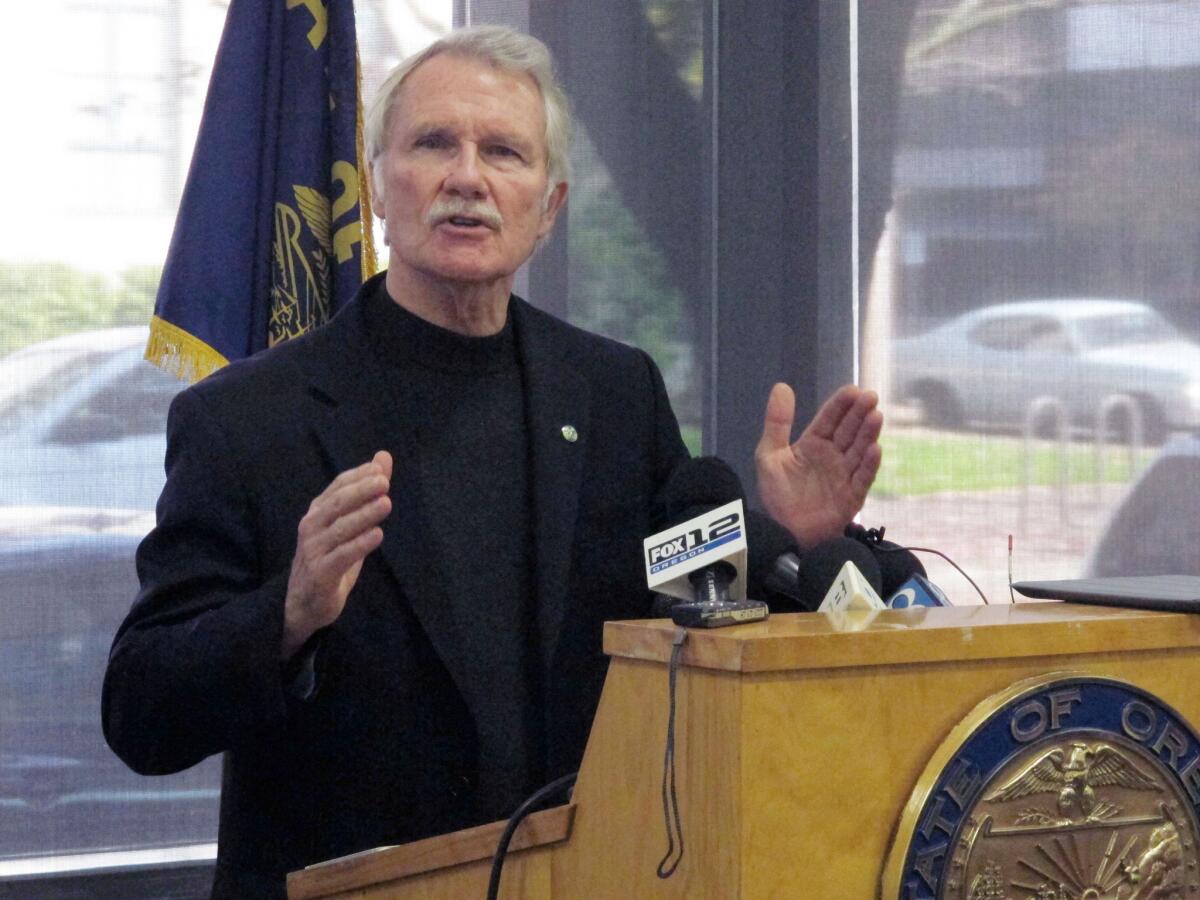Oregon governor opens bid for 4th term despite rocky Obamacare rollout

- Share via
When Oregon Gov. John Kitzhaber announced his bid for a fourth term Monday, it was no surprise that he did so at an elementary school – a long way from the headquarters of Cover Oregon where software engineers are still trying to fix problems with the state’s healthcare exchange and get it online.
Though the three-term governor looks formidable against his Republican opponents, the embarrassing rollout of Cover Oregon, which serves as the portal for residents to sign up for health insurance coverage, has clouded his re-election campaign. Kitzhaber’s focus Monday on education initiatives and tax reform—rather than making his centerpiece the state’s work on improving healthcare—was just the latest example of how the politics of Obamacare have reshaped the political landscape for the 2014 election cycle, even in blue states like Oregon.
Obamacare’s troubles, from millions of canceled insurance policies to the malfunctioning website, have provided a ready arsenal for Republican challengers of Oregon’s Democratic U.S. Sen. Jeff Merkley. Though the independent Cook Political Report still rates Oregon as a solid Democratic Senate seat, the Republican National Committee has targeted Merkley with robocalls--accusing him of lying when he said Americans would be able to keep their healthcare plans under the new law--and has promised a vigorous campaign to come.
Merkley’s Republican opponents have kept him on the defensive, questioning his oversight of the more than $305 million allocated to Oregon to set up its exchange. (The freshman senator, however, has $2.3 million in cash on hand to defend his record, a treasury that dwarfs those of his opponents, a slate of political newcomers including information technology consultant Mark Callahan; state Rep. Jason Conger; Portland attorney Tim Crawley; Jo Rae Perkins, a former chair of the Linn County Republican Central Committee; and pediatric neurosurgeon Monica Wehby).
For now, Kitzhaber and Merkley have sought to direct voters’ attention to the state’s success in slashing its rate of uninsured by 20% by enrolling Oregonians in Medicaid under the healthcare law’s expansion of that program. That feat was exactly where Kitzhaber steered the conversation during his press conference Monday.
“I’m certainly willing to take a few slings and arrows about the rocky rollout,” Kitzhaber told reporters at a South Portland elementary school Monday. But by next year, he said, the state “will have over 100,000 Oregonians, who don’t have health insurance today, who will have coverage, and that is remarkable.”
With plans to double that number by next year, “that will have a huge impact on the ability of these folks to be productive members of society, and will dramatically reduce the cost shift onto the business sector,” Kitzhaber said. “There’s nothing bad about that.”
Kitzhaber noted that he had made major staffing changes at Cover Oregon and had ordered an “after-action assessment” to “find out exactly what happened.” (During a recent interview with MSNBC’s Chuck Todd, Merkley said he placed the blame squarely on Oracle, the tech firm hired by the state to build its online marketplace where individuals were supposed to be able to shop for plans).
Now under new leadership after the departure of Executive Director Rocky King, Cover Oregon plans to release updated enrollment figures Tuesday. Forced to rely primarily on paper forms because of the problems with its online exchange, the state has received more than 54,000 applications that are being processed by hundreds of newly hired workers.
Kitzhaber said Monday that state workers have enrolled 8,300 people through the exchange, a small dent in a state where 560,000 people are uninsured. But that figure marked an uptick in pace from last week when Cover Oregon officials said they had enrolled 219 Oregonians in private plans so far; and that an additional 3,470 qualified for coverage through the Oregon Health Plan, the state’s Medicaid program. (By contrast, neighboring Washington state has emerged as a national model, enrolling 176,000 people through its exchange with 97,273 applications in process).
Kitzhaber said Monday he had no doubt that the problems with the state’s healthcare website would be a re-election issue. “I’m pretty closely identified with this whole healthcare transformation, and I’m fine with that,” he said.
“The website will get up and running,” he said at one point. “We will in fact get there.”
Two Republicans have announced their intentions to run against Kitzhaber: Dennis Richardson, a state representative; and rancher Jon Justesen.
Twitter: @MaeveReston
More to Read
Sign up for Essential California
The most important California stories and recommendations in your inbox every morning.
You may occasionally receive promotional content from the Los Angeles Times.














